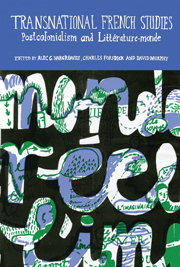Book contents
- Frontmatter
- Contents
- Acknowledgements
- Introduction: What Does Littérature-monde Mean for French, Francophone and Postcolonial Studies?
- From World Literature to Littérature-monde: Genre, History and the Globalization of Literature
- Francophone World Literature (Littérature-monde), Cosmopolitanism and Decadence: ‘Citizen of the World’ without the Citizen?
- From Weltliteratur to World Literature to Littérature-monde: The History of a Controversial Concept
- Littérature-monde in the Marketplace of Ideas: A Theoretical Discussion
- The Postcolonial Manifesto: Partisanship, Criticism and the Performance of Change
- Postcolonialism, Politics and the ‘Becoming-Transnational’ of French Studies
- Mapping Littérature-monde
- Afterword: The ‘World’ in World Literature
- Appendix: Toward a ‘World-Literature’ in French
- Notes on Contributors
Francophone World Literature (Littérature-monde), Cosmopolitanism and Decadence: ‘Citizen of the World’ without the Citizen?
from From World Literature to Littérature-monde: Genre, History and the Globalization of Literature
- Frontmatter
- Contents
- Acknowledgements
- Introduction: What Does Littérature-monde Mean for French, Francophone and Postcolonial Studies?
- From World Literature to Littérature-monde: Genre, History and the Globalization of Literature
- Francophone World Literature (Littérature-monde), Cosmopolitanism and Decadence: ‘Citizen of the World’ without the Citizen?
- From Weltliteratur to World Literature to Littérature-monde: The History of a Controversial Concept
- Littérature-monde in the Marketplace of Ideas: A Theoretical Discussion
- The Postcolonial Manifesto: Partisanship, Criticism and the Performance of Change
- Postcolonialism, Politics and the ‘Becoming-Transnational’ of French Studies
- Mapping Littérature-monde
- Afterword: The ‘World’ in World Literature
- Appendix: Toward a ‘World-Literature’ in French
- Notes on Contributors
Summary
‘I, too, am a translated man’
Salman Rushdie, Shame (1983)The resurgence of cosmopolitanism as a ‘wedge issue’ in the 2008 US presidential election following Barack Obama's reference to ‘citizen of the world’ (one occurrence), ‘people of the world’ (six occurrences), and ‘world’ tout court (a stunning thirty occurrences) in his 24 July 2008 Berlin speech, is a reminder that cosmopolitanism is a powerful precedent for any ‘world’ philosophy, whether related to law, politics, economy or letters. The candidate Obama's oratorical ‘worldliness’ led to George F. Will's column ‘The Cosmopolitan’, in which Will associated the expressions ‘citizen of the world’ and ‘global citizenship’ with the elevation of ‘narcissism to a political philosophy’. To be a citizen of the world is an oxymoron, Will argued, since ‘Citizenship is defined by legal and loyalty attachments to a particular political entity with a distinctive regime and culture. Neither the world nor the globe is such an entity’ (Will, 2008). This preceded Rudy Giuliani's Republican convention line, ‘I'm sorry that Barack Obama feels that [Sarah Palin's] hometown isn't cosmopolitan enough’ (Giuliani, 2008), which was abbreviated in sound bites to the curt jeer, ‘Not Cosmopolitan Enough for You?’
The ‘world’ has been creeping into the place occupied by the term ‘French’ or ‘Francophone’ in descriptions of the increasingly transnational field of literature studied by vingtièmistes in the French field: the French-language or Francophone linguistic basis of littérature-monde is simply designated through the language of the term describing the targeted corpus.
- Type
- Chapter
- Information
- Transnational French StudiesPostcolonialism and Littérature-monde, pp. 15 - 35Publisher: Liverpool University PressPrint publication year: 2010
- 1
- Cited by

